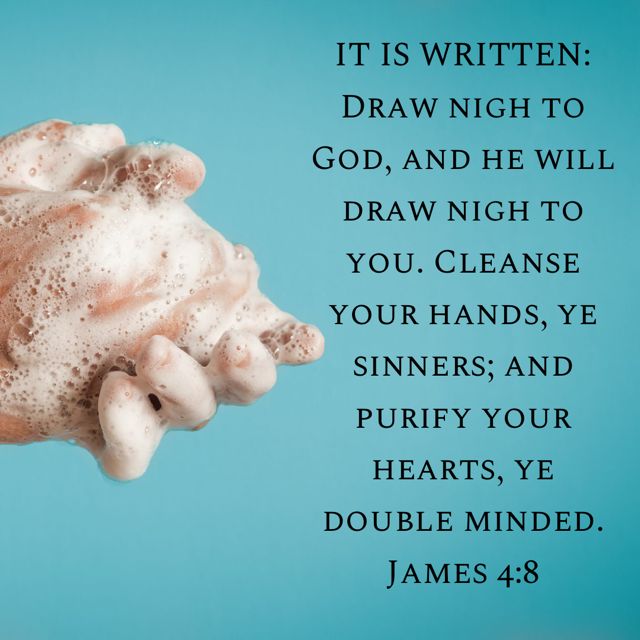THE SEED
“Draw near to God and He will draw near to you. Cleanse your hands, you sinners; and purify your hearts, you double-minded.” James 4:8 NKJV
In this end time, the experience we see the most is that people want God to draw near to them without any commitment from them. The scripture is precise in the order of this commitment. If we desire the nearness of God to us, we have to first show our interest in making the first move by drawing closer to God. James 4:8 calls us to a life of closeness with God, promising that as we draw near to Him, He will draw near to us. This is both an invitation and a promise. God desires intimacy with us, but He also calls us to holiness, this is highlighted in the second part of the above scripture, “Cleanse your hands, you sinners; and purify your hearts, you double-minded.” Drawing near to God means humbling ourselves, repenting of sin, and seeking Him with total sincerity. God is not distant; He is always ready to meet us when we come before Him with a repentant and sincere heart. When we seek God with our whole hearts, we will surely find Him. We will experience His presence and His peace. It is high time for us to take steps to align our lives with His will as echoed in the Biblical reading below. Let us remove distractions, and seek Him earnestly, trusting that He is faithful to respond. As we draw near or nearer to God from today, let us do so with confidence, knowing that His love and grace await us.
BIBLE READING: James 4:4-10
PRAYER: Heavenly Father, I desire to draw near to you more than before, I realise that I can not do this by myself, so I ask for your grace to help me draw near to you in all that I do, in Jesus’ name. Amen
“Ẹ SÚN MỌ́ ỌLỌ́RUN, YÓÒ SÌ SÚN MỌ́ YÍN”
IRUGBIN NAA
“Ẹ sún mọ́ Ọlọ́run, yóò sì sún mọ́ yín. Ẹ wẹ ọwọ́ yín mọ́, ẹ̀yin ẹlẹ́ṣẹ̀, kí ẹ sì wẹ ọkàn-àyà yín mọ́ gaara, ẹ̀yin oníyèmejì.” Jákọ́bù 4:8 NKJV.
Ní àkókò òpin yìí, ohun tá à ń rí jù lọ ni pé àwọn èèyàn ń fẹ́ kí Ọlọ́run sún mọ́ wọn láìjẹ́ pé wọ́n ṣe àdéhùn kankan. Ẹsẹ Ìwé Mímọ́ náà ṣe kúlẹ̀kúlẹ̀ àlàyé nípa bó ṣe yẹ kí àdéhùn yìí wáyé. Bí a bá fẹ́ kí Ọlọ́run sún mọ́ wa, a gbọ́dọ̀ kọ́kọ́ fi hàn pé ó wù wá láti ṣe ìgbésẹ̀ àkọ́kọ́ nípa sísún mọ́ Ọlọ́run. Ìwé Jákọ́bù 4:8 rọ̀ wá pé ká sún mọ́ Ọlọ́run, ó sì ṣèlérí pé bá a bá sún mọ́ ọn, òun náà á sún mọ́ wa. Èyí jẹ́ ìkésíni àti ìlérí. Ọlọ́run ń fẹ́ ìfararora pẹ̀lú wa, ṣùgbọ́n ó tún ń pè wá sí ìjẹ́mímọ́, èyí ni a tẹnu mọ́ nínú apá kejì ìwé mímọ́ tí a kọ́ lókè yìí, “Ẹ wẹ ọwọ́ yín mọ́, ẹ̀yin ẹlẹ́ṣẹ̀; kí ẹ sì wẹ ọkàn yín mọ́, ẹ̀yin oníyèmejì”. Sísúnmọ́ Ọlọ́run túmọ̀ sí pé ká rẹ ara wa sílẹ̀, ká ronú pìwà dà ẹ̀ṣẹ̀ wa, ká sì wá Ọlọ́run tọkàntọkàn. Ọlọ́run kò jìnnà sí wa; ó máa ń wà ní sẹpẹ́ láti pàdé wa nígbàkigbà tá a bá fi ọkàn tó ronú pìwà dà tọkàntọkàn wá sọ́dọ̀ rẹ̀. Tá a bá fi gbogbo ọkàn wa wá Ọlọ́run, a ó rí i dájú pé a rí i. A ó rí i pé ó wà pẹ̀lú wa, a ó sì ní àlàáfíà. Àkókò rèé fún wa láti gbé ìgbésẹ̀ láti mú ìgbésí ayé wa bá ìfẹ́ Rẹ̀ mu gẹ́gẹ́ bí Bíbélì kíkà tó wà nísàlẹ̀ yìí ṣe fi hàn. Ẹ jẹ́ ká mú àwọn ohun tó lè pín ọkàn wa níyà kúrò, ká sì máa fi tọkàntọkàn wá Ọlọ́run, ká ní ìgbẹ́kẹ̀lé pé ó máa dáhùn àdúrà wa. Bí a ti ń sún mọ́ Ọlọ́run láti òní lọ, ẹ jẹ́ kí a ṣe bẹ́ẹ̀ pẹ̀lú ìdánilójú, ní mímọ̀ pé ìfẹ́ àti oore-ọ̀fẹ́ Rẹ̀ ń dúró dè wá.
BIBELI KIKA: Jákọ́bù 4:4-10.
ADURA: Baba ti o wa ni ọrun, Mo fẹ lati sunmọ ọ diẹ sii ju ti iṣaaju lọ, Mo mọ pe emi ko le ṣe eyi funrararẹ, nitorinaa Mo beere ore-ọfẹ rẹ lati ṣe iranlọwọ fun mi lati sunmọ ọ ni gbogbo ohun ti Mo ṣe, ni orukọ Jesu. Àmín.
